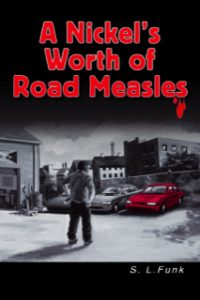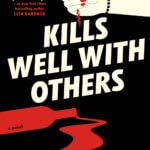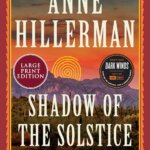Stephanie (Van Why) Funk joins me today. She was born in Connecticut and learned her love of the written word early, thanks in no small part to having a mom who read to her every night at bedtime. Funk holds a BA from UMASS for Creative and Journalistic Writing. Besides full length pieces, Funk has been published in a number of newspapers and magazines across the country, including the Recorder, an independent paper located in western MA and in magazines such as the Thoroughbred Times. Her debut novel, A Nickel’s Worth of Road Measles was released in April of 2020. Besides writing, Funk is an avid racer of both automobiles and vintage motorcycles, a background that she calls upon in her novel. Funk lives in western Massachusetts with her husband, Edward, a veterinarian. She has several more works in the pipeline, including a caper titled Write on Main Street, scheduled for release summer of 2020. She is also working on another thriller, tentatively titled I Know You.
SS: Welcome, Stephanie. Can you share a bit about your background?
SF: Sure, I grew up in a small town in northwestern Connecticut called Norfolk. From an early age, I loved books and reading. This was thanks to my mom, Priscilla ‘Pat’ Van Why. Some of my earliest memories are of her reading to me at night. I recall not being able to read the words but being able to follow along with the photos. One of my happiest moments came when I realized I could actually make out what the word meant. This early introduction launched me into being an avid reader.
From an early age, I wanted to be a novelist. I was always writing stories as a child, with dreams of finishing a complete work. But I got away from writing, as so many of us do. In 2001, I was hired by the local newspaper, the Recorder, now the Greenfield Recorder. I was doing the police and court logs. My passion was rekindled, so I branched out into writing articles, held a regular column for a while and then started writing for magazines. In 2010, I sat down and attempted to write a full length novel. Titled Dead Ringer, it was a massive 180k word manuscript that resides on my hard drive to this date. Like many first attempts, while not publication worthy, it was a valuable teaching tool.
I followed this with my next work, Write on Main Street, a tongue in cheek caper slated for release this summer. A Nickle’s Worth of Road Measles was actually my third piece, and the one I felt was worth starting out on.
I pitched both Nickel and Write to agents over the years, with mixed results. An agent at a conference in 2012 initially seemed excited over my work. She then asked me for my credentials. At the time, I only held a high school diploma. I can still see the disappointment on her face when I told her that. She said to me, “You can be a good writer, but I have to sell you to the publishers.” At that point, I realized I had to get the education sorted. I enrolled in college in 2013 and graduated from UMASS this past spring with a BA in Creative and Journalistic Writing. Before the ink was dry on the diploma, I was releasing Nickle.

SS: What was an early experience where you learned that language had power?
This has been a recent revelation to me. Not that language had power, but that I had a “superpower”: the ability to write. The song, “If You Could Read My Mind” by Gordon Lightfoot, resonates with me. Over the years, I’ve written stories that got feedback. Sometimes readers told me it made them cry or it made them laugh. But it was recent, this past January in fact, when I realized the potential power I had.
I raced against an amazing young woman last season in vintage motorcycles. This was my first season and her fourth one. She beat me in every event. I’ve been around a long time; I could have been jealous, instead I was proud of her. We were teammates too, coming from the same motorcycle shop, Nova Motorcycles in Turners Falls. So we laughed and shared experiences and tips with each other instead of becoming sour with one another.
I wrote a story about her season, and then I contacted the local paper. I’ve written for them over the years and have been writing for them recently. They were all too happy to take the story. I shipped it off with a couple of photographs (I contacted the photographer and received permission) then I sat back and waited. I didn’t mention this to anyone other than my husband. Two days later, the story ran. That story showed up all over Facebook. And it not only gave her a much needed shout out, but it also made the shop and the other people involved so happy. The photographer was happy to have his work in a newspaper. And then there was the fact I had so publicly congratulated a fellow competitor who had trounced me pretty soundly, an appreciation of the sportsmanship. Someone from the shop posted and said, “This is just so much awesome rolled up into one thing.” That made me feel really good.
SS: When I read other authors’ biographies, mine seems dull by comparison. How do you feel about your life story? Have you ever been tempted to jazz yours up?
SF: Oh, lord ,no. I have had an unorthodox life, to put it mildly. Here’s a fact about my trajectory; as a child, I fell in love with horse racing, particularly when Secretariat came along. The reason (or one of them) that I did not attend college right out of high school was because the year I graduated, I headed straight to the horse racetracks. For much of the 80’s, I held a trainer’s license for Thoroughbreds. I learned to gallop them, condition them, take care of them, ship them, and every other aspect of the sport. When I started racing off the farm in Connecticut, I needed a job. The auto race track Lime Rock Park was in the area, so it made sense that I would go to a track for a job, right? Little did I know how that would turn out! Over the years, I had a harder and harder time with letting any horse I had in my care end up at risk, so I phased out of horse racing and into motor sports. And here I am.
SS: What are you working on at the moment?
SF: I have a few irons in the fire. A blessing or a curse as it may be is the fact that as an independent writer I can write in whatever genre strikes me. My first two pieces couldn’t be more different. Write on Main Street is a funny, tongue in cheek caper written along the lines of the Janet Evanovich genre, although completely in my (sometimes salty) voice. This was written before Nickel, which turned out to be this dark thriller. It is different enough that I will be using a pen name in order to not alienate the people who enjoy the thrillers.
Now that Nickel is out, I am working on getting Write ready for release. I also just started a follow up to Nickel, a suspenseful thriller that is promising to have twists and turns all over the place.
Besides these projects, I have a literary fiction piece I have been carefully working on for some time now. This will be a coming-of-age novel set against the backdrop of the Vietnam war in a small New England town.
I have so many stories rattling around in my head, I just hope I can live long enough to get them all out.
SS: Which non-literary piece of culture could you not imagine your life without?
SF: That would have to be the racing world. You either get it, or you don’t. Some of the finest people I have ever met I’ve met on the race track. From the “backside” of Thoroughbred tracks around New England to auto and motorcycle tracks around the country, people who are into racing are a bold, imaginative, and intelligent breed. In the motorcycle world, I was astonished to find so many women competing, both in racing or having fun at track days. These ladies are dentists, executives, mechanics, mothers, wives and more. They toss a leg over a bike and can absolutely smoke some of the dudes, ponytails waving in the breeze. While there are many women in auto racing, there are many more on motorcycles, something that surprises me.
SS: What epitaph would you want most to be written about you when it’s all said and done? What epitaph would you like at the end of your life?
SF: “It didn’t make me stronger.”
SS: If you could have been the original author of any book, what would it have been and why?
SF: I think To Kill a Mockingbird, Harper Lee’s excellent work, or Laura Hillenbrand’s Seabiscuit. To Kill A Mockingbird because in A Nickel’s Worth of Road Measles, I write in the voice and mindset of a child in places, and I really enjoyed that. In fact, I liked it so much, that I am carrying it over to my literary fiction piece. And Seabiscuit because Hillenbrand did a masterful job about a world I know intimately. Maybe one day I will write a piece about the horse racing world.
SS: If you time-warped fifty years into the future and found that something you created has become a trope or buzzword, how would you feel? Would you feel cheated of royalties or vindicated as a genius?
SF: Honestly, the money isn’t really the driving factor for me. Don’t get me wrong; I would love to be one of the few elites in this business, but let’s be real; you can be the best writer of your generation and still be rejected over and over. I don’t know about the genius part, but I would be thrilled and humbled to have created something that has a life of its own.
SS: Do the parts of your story that move your readers most move you as well? Or does your special position as Creator give you a different ear for the highs and lows of the tale?
SF: Here is something that happened to me while writing A Nickel’s Worth of Road Measles that kind of was amazing and disturbing at the same time; it started writing itself. I had a story arc in mind, that I would start at point A and end up at point Z. What I did not see coming were the days when it was like I was channeling something else. The story would flow, and I was ripping along, wondering what was going to happen. I had times when I had to push away from the computer and walk away, like I needed a shower. I would wonder where the hell this stuff had come from, how the connections in my brain had happened. I had a different story in mind when I started, but the one that came out was infinitely better than what I originally planned. I hope this ‘lightning in a bottle’ happens again with my new piece, ‘I Know You.’
SS: Who do you most wish would read your book?
SF: There’s more than one, but how I wish the masters would read it: Stephen King, Dean Koontz, Lisa Gardner, Lee Childs, etc. And the presidents of Penguin and Random House … I never got to knock on their doors because I couldn’t gain any traction with the agents.
SS: What is a fun or strange source of inspiration that ended up in your book (a name, location, line of dialogue, etc.)?
SF: Well, at the risk of giving too much away, there is a lot of real life that creeps into Write on Main Street. We had some very interesting events happen in my small town when I was working at the paper. Those newsroom conversations were among the most interesting parts of that job. You know how they say, ‘You can’t make this stuff up?’ Well, that is very true. Besides the newsroom, I also snuck in things I had heard over the years from different people, sayings and stories that added a dimension to this work that I couldn’t have given it alone.
SS: It is often believed that almost all writers have had their hearts broken at some point in time, does that hold true for you?
SF: I think every human being out there has had their heart broken, sometimes multiple times. In 1991, I lost my mom completely unexpectedly. That broke me in ways I never knew you could break. As the years have passed, the hurts have piled up. I think in some ways, this tearing off of the scab over and over is part of what makes a writer write with depth. Pain adds another dimension to joy. And in this terrible year, those hurts keep coming as COVID-19 fractures our lives into a million pieces, like a brilliantly colored box of tiles that is shattered on the ground. What happens to those shards is up to you; you can leave them in a pile on the ground or piece them together again in a mosaic.
SS: Regardless of genre, what are the elements that you think make a great novel? Do you consciously ensure all of these are in place?
SF: Believability, attention to detail and a solid skeleton for your story. If you are writing about people, stop and think; would someone do that or react that way? Besides this, I follow a structure that gives me a hook, a precipitating incident to launch the story, an arc that moves along well, and doesn’t drag. The characters have a ‘pet the dog’ moment where their humanity shows. The story builds to a climax and has a resolution. I try to avoid wandering around in my narrative in order to keep things moving along at a pace that will keep readers engaged. It’s what I like in a story.
SS: Isabel Allende starts all of her books on January 8 because she started The House of Spirits on that date. Do you have any superstitions or creative rituals about your writing?
SF: Oh, lord, no. If I started constraining myself by superstition, I would never get anything done.
SS: Do you ever incorporate something that happened to you in real life into your novels?
SF: Yes, in Write on Main Street, as I said before I weave in many things that I saw and heard over the years living in a quirky small town.
SS: Do you read your book reviews? How do you deal with bad or good ones? Does a bad one affect your writing?
SF: I do read them. I haven’t gotten a bad one … yet … although I am sure it’s coming. I hope I can look for the constructive criticism in it and take it to be useful instead of letting it hurt me. Not everyone is going to like my work.
SS: What is your most recent book? In twenty-five words or less, tell me why your book should be a reader should start your book next.
SF: A Nickel’s Worth of Road Measles was out as of April 1, 2020. A thriller with paranormal elements, it’s a dark, fast moving gritty tale with a surprisingly satisfying ending.
SS: Who is the protagonist in your most recent work? Describe him/her in ten words or less.
SF: Gerry Donahue is a good man at war with himself.
SS: At what point did you come up with the title?
SF: The title is an auction term. A “nickel’s worth of road measles” means there are stone chips all over the hood and front end of the car. It will cost around $500, or ‘a nickel’ to fix it.
SS: Can you share with us a bit about the moment when the idea for your novel first popped into your head? Did the idea come to you all at once, or did different pieces of the story come to you over time?
SF: I am always doing, ‘what if’ in my head. I’ve fantasized about being able to read people’s thoughts. But what if you could ‘see’ things that happened and climbed into a car where a murder took place? That started the whole idea.
SS: Was the decision of how to structure the novel obvious?
SF: No. This was a propitious structuring that occurred spontaneously. Initially, I wanted to give flashbacks to fill in the blanks of the early years. It just developed into the back and forth I ended up with; two story lines coming together simultaneously. I tweaked it in places once I realized how well it worked, to keep them in the back and forth.
SS: Julian Barnes (The Sense of an Ending) says that one of the things he has learned as he grew older is how to manage time in a novel. Have you found an effective technique for this?
SF: Timelines were tough in spots. I had to literally set a date of birth for my protagonist and work out the years and progression of his life. That was a learning curve.
SS: If you stray from a chronological time frame, did you write the book in the order in which it appears on the page, or did you write it in a chronological order and later rearrange?
SF: I wrote both stories chronologically. When editing, I read through both stories separately in order to make sure there weren’t any holes or wonky timelines happening.
SS: Where and when is your book set? How did you decide on the setting? The timeframe?
SF: It starts in the 1960’s and ends in 2006. The beginning timeline was because I was born in the sixties. I felt I could write about being a child then accurately. This included the use of language common to that era; the way kids disrespected each other, the names they called each other.
Also, without giving too much up, things that happened to these kids in this story were things that really happened in that era. A lot of things were ignored or swept under the table. It’s only been fairly recently that we have realized how terrible some of these things were. Some readers are going to be disturbed by these things; I can tell you I was while writing about it. And I can also tell you that I witnessed some of these things back then.
I chose to end the book 14 years ago because of technology. It’s moving so fast I can’t keep abreast easily. The technology of 14 years ago is a lot simpler for me to deal with.
SS: Do you know the ending to your story when you put pen to paper? If so, have you ever changed the ending after you started to write?
SF: No! Not at all. I mean, I had an idea, but man…I had connections happening that were fast and furious, connections I never saw coming. That was pretty cool; it was like I was reading the story as it happened.
SS: What advice would you give aspiring writers?
SF: Learn the basic skills; grammar, punctuation, sentence structure.
Don’t bog down thinking you have to write a huge amount daily. Make yourself write something every day. Maybe it’s just a sentence, maybe it’s 1,000 words. But just plod forward, even if you feel stuck.
SS: I love your twist on the old adage “write what you know”—you turn it from the usual advice to writers from writing from their experiences to writing what they know of their book-to-be.
Write to what you know. If you know how your story opens, an event that happens in it and the ending, work it like stepping stones. So much of what we write is a mystery until it’s down on paper.
If you get to the stage of agents and selling your work, be prepared for lots of rejection, lots of people telling you how you should write something or what your work is wrong or this or that. This is your story; not theirs. If’s it’s something that is helpful to you to hear, pay attention and learn. If it’s not, move on. Don’t get caught up reworking everything for one person, because you will have fifteen different people wanting you to rework it fifteen different ways. I hate to tell you how many thousands of dollars I spent on having professional editing done multiple times thanks to that, all because agents said, “If you wrote it this way, I would consider it.” They never do …
SS: Describe your books in 3 words:
SF: A gritty thriller
SS: When writing, are you a night owl or morning person?
SF: Morning.
SS: Pantser or Plotter?
SF: Pantser
********************

********************
Chapter 33 from A Nickel’s Worth of Road Measles
The little house looks dingy and sad as Gramma pulls up in front of it. I sit and stare for a long, long moment. I don’t want to get out of the car.
Gramma is talking, talking, talking, she won’t stop talking, her voice like white fire in my ears. I stare at the doors, the windows. The little house is wrong somehow, evil. Windows are blank holes that swallow all light, not shining or nothing. I say nothing as Gramma comes around the car, still talking, talking, talking. I can hear my heart pounding in my ears. She doesn’t seem to notice anything, just grabs my red suitcase and says over and over, you’re HOME now, you’re HOME! Everything will be ALL BETTER now that you are home. She doesn’t seem to notice that I am shaking, quivering, feeling like a million thousand ants are marching all over me, biting me.
Without a word, I slide from the seat and reluctantly follow her up the sidewalk. She sets my red suitcase down on the flaking gray painted floor of the porch, her hand trembling as she struggles to slot the key in the door. Don’t do it! I scream in my mind. Don’t! My lips are blocks of ice, frozen, struck mute. She doesn’t hear me, her mouth moving, moving, moving. She turns the key and swings the white door open, gesturing into the blackness to me.
I freeze, unable, unwilling to move forward. Gramma is talking at me, taking my hand, pulling me forward into the house, my white sneakered feet skidding slightly as I hit the mousy blue rug on the inside. Smells assail me immediately, familiar smells, then sounds, noise from the inside, from someplace deeper inside a rattling bang followed by a whir of something mechanical, something maniacal. I freeze, my bowels turning to water.
Gramma turns to me then, her mouth still moving, fear in her eyes, her gray lined face suddenly at the end of a long tunnel as I begin to scream long wordless shrieks, high pitched keening noises. HE killed my mommy. Right here. Right underneath me as I flailed on his back. She died in a gurgle of black blood, blood that soaked into my skin as I fought for my own life. I was there, and I remember everything, it assaults me like a movie unspinning at superhigh yet superlow speed as I stand there and shriek. My Gramma shot me, shot me in the head trying to kill him, almost killing me. And HE is still alive.
********************
You can follow Stephanie here on social media:
Website | Facebook | BookBub | Goodreads














